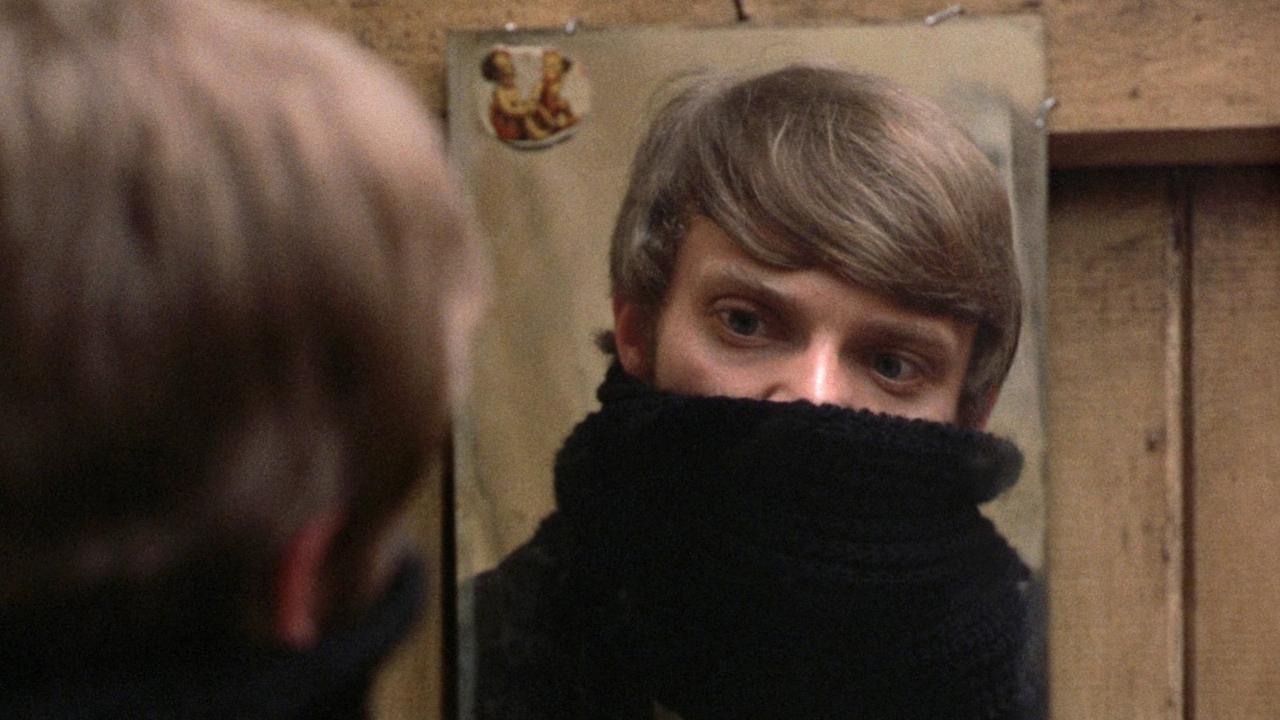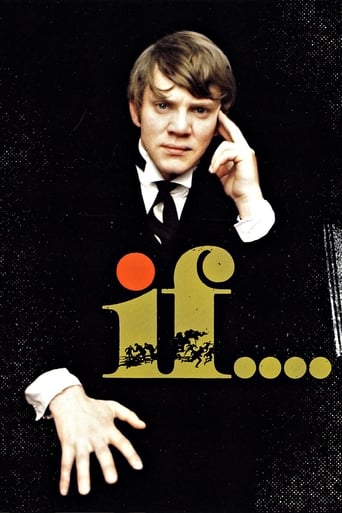

If... (1968) is the first of the unofficial Mick Travis trilogy from filmmaker Lindsay Anderson. It's a significant film in the 1960s counterculture and would come to be influential for other filmmakers in the decade to come. The film is very rooted in the late 1960s and acts as a sort of surreal snapshot of the social tensions of that era. Even today, If... plays well as a story about shaking off stifling tradition and challenging the status quo. Its ending shoot-out is shocking, especially in the light of the mass shootings which we hear of so often in the current century.That being said, there are some problems. If... is Anderson's most iconic movie but not necessarily his most powerful or focused. I felt the film sometimes loses itself toward the middle, dragging down the pacing. The switching between black-and-white film and color is distracting and needless (people try to find meaning in it, but the constant swapping is only there because the filmmakers had budget issues). The parts of If... feel much more satisfying than the whole.The ending has also provided issues with some viewers, who are ambivalent about Mick's (possibly symbolic more than literal) mass murder of the school faculty. Are Mick's actions justified by Anderson? Are we to condemn him? Is this conclusion the inevitable result of oppression and class-based struggle? It's all hard to pin down and has put off some people I have spoken to on the subject of If..., but for me, the questions raised by the bloody finale of the film only make it all the more interesting.O Lucky Man! is a better satire and This Sporting Life is a more poignant look at class struggle-- however, neither has the rousing, youthful exuberance of If... which makes it unique and provides much of its appeal to this day. For all its flaws, it remains one of Anderson's best loved movies.
... View MoreThis glorious 1968 film is a document not just of its times but of the eternal and mysterious communion between two enormous artists. Lindsay Anderson, the director, the mentor, the older man and Malcolm McDowell his young, brilliant, loving disciple. The trust between this two men is overwhelming and the results are in every frame in every nuance. For me, to see this film after many years was a remarkable emotional experience. Daring, visionary with a Malcolm McDowell that broke new ground with the fearlessness of an explorer venturing into totally virgin territory. Brilliant, beautiful, unique. Lead by the magical hand of Anderson and McDowell we confront the anger of the artists with their love for each other. Wow!
... View MoreReleased in 1968, directed by Lindsay Anderson with a screenplay by David Sherwin, IF... is a story of three non-conformist schoolboys played by Malcolm McDowell, Richard Warwick, David Wood, who plot revenge. Organized as a series of tableaux separated by title cards, IF... spends its first half depiction the harsh rules that these boys live under at their elite public school, and the arbitrary punishments given out by senior boys, headed by the sinister Rowntree (Robert Swann) and the distant school officials. This is all in an environment of bizarre old rituals, Latin refrains, and hardly more intelligible English public school slang (and of course, it wouldn't be a classic story of British public school life without some innuendo about buggery.) Then, as the storytelling takes on an increasingly surreal tone where we question what is real and what is fantasy, the boys and a girl from town get their hands on weapons and go after those who have wrong them.The 1960s was a time of war in Vietnam (and other violent conflicts brought to viewers globally by the media) and youth uprisings in the United States and France. Plus, these elite British school also featured compulsory military drill. In IF..., the walls of these boys' dormitory is covered with magazine cutouts of war photographs, as if to say that in a violent world, it is no surprise if the young too made recourse to violence. In this respect it feels very much like a precursor to Aki Kaurismäki's THE MATCH FACTORY GIRL. IF... also reflects the new sexual freedom of 1960s Britain, and the frustration kindled in these young men who see such open sexual expression in magazines and town streets but cannot have any of it. There are a number of films from this era that document the rise of a counterculture and more open attitudes, but few are as sympathetic to these young people as this film of Anderson and Sherwin.The only serious flaw of IF... is that the main actors are too old to convincingly play teenagers, being in their mid 20s at the time of shooting. Imagine how much more shocking the film would be if it were real sixth-formers acting, though I suppose the (few) sex scenes made this impossible. Also, I must express my discontent with the quality of the audio, which is very muddy. Still, IF... is deservedly a classic, and it is available in a Criterion edition packed with enjoyable and informative extras, so I can give this a very strong recommendation.
... View MoreI had never seen this film, but was curious for a long time. And 'If....' delivered. The setting of an English boarding school, the hierarchy of it, a teacher who cycles through the hallways right into the classroom and straight after engages his class to think about and debate World War I, and many other wondrous specifics that come with these unique surroundings, have a great appeal to me; it is a fascinating world of knowledge, discipline, corporal punishment, innocence, adolescence, rebellion, order, and so on, which is portrayed magnificently in 'If....'. The fact that Monty Python didn't start airing until 1969 (I had to look that up), gives me the idea that this film must have been quite an inspiration...'If....' has quite a few absurd details in it, and black humour and vicious sneers pointed at the British (schooling) system. The changing from color to black and white is one of those; at some times I could understand why there was a change, at other times I couldn't, but that seemed to be deliberate, as to make the experience as much confusing for the viewer as it is for the characters in the story (what is real and what is not?). The escape per motorcycle and what ensues in the roadside café is another - great - one. I'm not sure how much I liked the ending though, since I was more looking forward to a sober and sinister confrontation between the powers that be and our defiant trio.McDowell plays excellently, but never at the cost of any of the other actors, I'm very glad to say. I would call this a great film, yet the ending needs some more settling in with me. Oh well, I'll just watch this one again sometime... soon, I hope.A big 8 out of 10 for now.
... View More